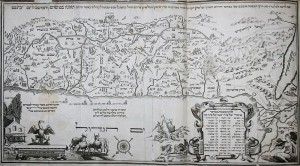One afternoon in a Chicago used bookstore, I ran across a booklet with the intriguing title, Britain in Prophecy.1 I’d heard about something called “British Israelism” and of some connections with Herbert W. Armstrong’s Worldwide Church of God. I was curious, so I plunked down my $6.00.
The author, Brian Williams, told this story: The southern tribes of Judah and Benjamin were allowed to return to the Promised Land from their captivity in Babylon. The 10 northern tribes—“Israel”—failed to make it home from Assyria and were dispersed among the nations. But prophecy demands that, in the end, they will be part of the Kingdom, so  they must still exist. In this connection, Ephraim and Manasseh made their way to England and America, where they have been a blessing. (The general notion has appealed to some pretty famous people, including Christian Science founder Mary Baker Eddy, New Zealand Prime Minister William Massey, and Yale professor C. A. L. Totten.) As for Williams’s rationale, here are some items of his so-called “proof”:
they must still exist. In this connection, Ephraim and Manasseh made their way to England and America, where they have been a blessing. (The general notion has appealed to some pretty famous people, including Christian Science founder Mary Baker Eddy, New Zealand Prime Minister William Massey, and Yale professor C. A. L. Totten.) As for Williams’s rationale, here are some items of his so-called “proof”:
1. Geography: Isaiah 31:8 and 14 speak of nations to the north and west, and verse 15 calls for glorification of “the name of the Lord God of Israel in the isles of the sea” (KJV).2 Unfortunately, the ESV and other modern translations render the “isles” of Isaiah 31:15 as “coastlands,” which could fit all sorts of non-British locales, including Finland and France.
2. Chronology: Taking his cue from Revelation 12:6-14, where prophecy links a count of three and a half to 1,260 days (meaning “years”), and then drawing on Leviticus 26:24 to set Israel’s penalty at a factor of seven (or double the three and a half), Williams gets a span of 2520 years. Counting from the beginning of the Assyrian captivity in 721 BC, he says that God’s judgment on Israel expired in AD 1800, at the time of the rise of the British Empire.
3. Genealogy: Working from Genesis 48, he says that Jacob’s blessing the younger Ephraim before his elder brother Manasseh means that Americans are from the latter tribe. The order of blessing made Manasseh the 13th child, and 13 figures prominently into American history, with its 13 colonies. Furthermore, verse 19 says that Manasseh shall become “a people” (America), while Ephraim shall become “a multitude of nations” (the British Commonwealth).
4. Etymology & Symbology: The name for the English county of East Anglia came from the Hebrew word, eglah, “meaning heifer or ox, which was the tribal symbol of Ephraim.” And then there’s the American seal, with its eagle, heavenly bodies, shield, arrows, and olive branch—all symbols connected with ancient Israel. (I’m surprised he didn’t link up with the first battle of the Civil War, Manasseh, especially since the other name for that conflict is Bull Run, which can be tied to the bullocks sacrificed in Israelite worship.)
The mind reels at this prime example of eisegesis (reading what you wish into the text), as opposed to the legitimate practice of exegesis (unpacking what is actually in the text). Williams has scoured the Bible for anything he can enlist, however remotely, to bolster his fantastical claims. But questions crop up everywhere, e.g., “Why don’t native Englishmen seem Semitic?” Of course, this imaginative game can be fun: Maybe Turkey to the northwest, with its Ottoman Empire and moon-and-star flag is Israelite. Or why not identify Asher with America since there is a Mt. Carmel in several states,3 and Tyre connects with “tire,” manufactured by the American corporations, Goodyear, Goodrich, Firestone, and General—all based in Akron, whose Greek cognate, akrou, appears respectively as “uttermost” and “top” in Mark 11:27 and Hebrews 11:21.
Yes, the UK and US are fine places, but this doesn’t mean that Jenkins and Smiths are Hebrew. The Bible certainly doesn’t teach that.
——————————-
Endnotes:
1 Brian Williams, Britain in Prophecy (Birmingham, England: Brian Williams Evangelistic Association, Ltd.: undated)
2 Also, Hosea 11:9-10 says something about Ephraim and about children trembling at the Lord’s lion-like roar in the west.
3 Pennsylvania, Illinois, Indiana, and Utah
//
//